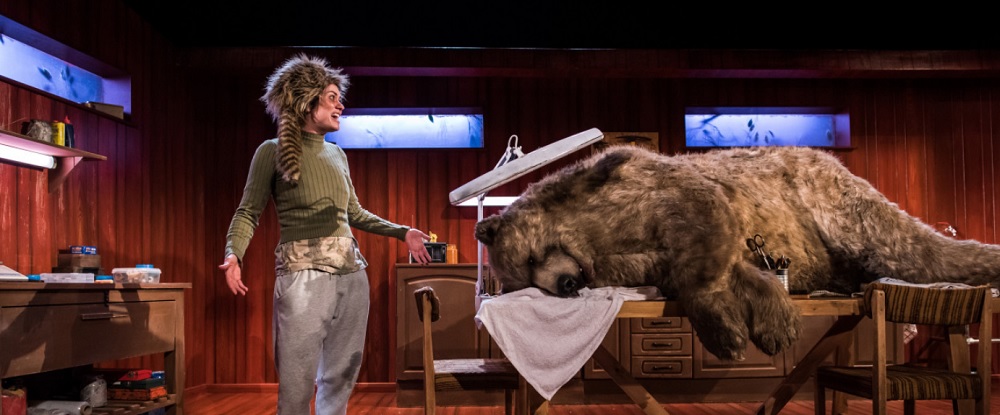Oliver Emanuel serves up a blood-stained dish of revenge in this new text; a surreal kitchen sink drama from the edge of reality in homage to Mary Shelley’s Frankenstein.
Mag’s a Taxidermist with a dark secret, and no, it’s not the dead bear on her kitchen table awaiting dressing in her log cabin in British Colombia. Her daughter Beth’s been in an out prison, and now she’s travelled thousands of miles to Canada to find Mag and her daughter. Beth’s a woman Mag has told everyone, even Beth’s daughter, is dead. This log side cabin is now the icy glacier on which Frankenstein confronts his murderous prodigy in the middle of its death spree. As they battle it out in the presence of the dead bear, we’re left to answer one question: is nature or nurture responsible for our failings?
Cécile Trémolières and Anna Orton’s searing red log cabin interior is wonderfully transformative and beautifully rendered, enhanced by Tigger Johnson’s effective lighting design from cosy retreat in the back of beyond to the scenes of jarring confrontation as a blizzard rages on. Of course, one could not possibly ignore the presence of the extremely impressive life-sized dead bear on the kitchen table, adding gravitas to both Mag’s backstory as a taxidermist and symbolising the untameable nature of wild animals. This is truly impressive setting and design work.
The characters of Beth and Mag are performed with conviction with Gareth Nicholl’s direction providing plenty of scope of shading the gulf of these flawed characters that both provide witty arguments for and against nature or nurture. From her poetic musings of the dichotomy of country and city life, to her profanity filled cursing’s of her mother’s ineptitude, Charlene Boyd provides an uncontrollable storm of relentless chaos as troublesome Beth. Portraying Mag, the obvious ‘straight man’ of this pair, is not an undertaking Christine Entwistle takes lightly. Both restrained and powerful, Entwistle’s characterisation of woman spiral from sobriety to alcoholism is a captivating watch. Particularly, her monologue about her imaginary daughter Elizabeth is both moving and disturbing in equal measures; this the only time we truly feel sympathetic for either of the characters. This play is not easy viewing. The entirety of the dialogue is focused solely on relentless confrontation and is at times uncomfortable, if not tiresome.
Oliver Emanuel’s exploration of super Ego vs. Id is presented with the allusion dial on ‘high’. The conceit of Mary Shelley’s Frankenstein is so heavily dealt to the audience that it almost feels laboured, and at times so underused it’s frustrating. Be it in the presence of the bear awaiting ‘galvanisation’ under lights on the table, or its bizarre halftime monologue that alludes to Frankenstein’s monsters most famous lines, ‘misery made me a fiend’. Even its presence in Beth’s monologue about her discovery of the text in prison is provides no new hypothesis to this age-old question of nature and nurture – it’s glazed over to provide logistical context to her arrival in Canada. We’re left wanting more from the text’s mediations on Frankenstein. And, taking into consideration the work of charities promoting reading in prisons, Beth’s line, ‘there’s almost no rehabilitation inside’ feels insensitive. Especially, as this text prompts her revenge. This is one metafictional stab too far.
Yet, Mag’s allusion laden pursuit of her murderous daughter in the snow (indebted to Frankenstein) is a fantastically crafted image by Nicholson and Emanuel. But disappointingly, amidst the barrage of shouting and accusations, the audience is no closer to discovering what it is that shapes us. Until 2nd November https://www.traverse.co.uk/whats-on/event/the-monstrous-heart
Reviewer: Melissa Jones
Reviewed: 23rd October 2019
North West End UK Rating: ★★★

